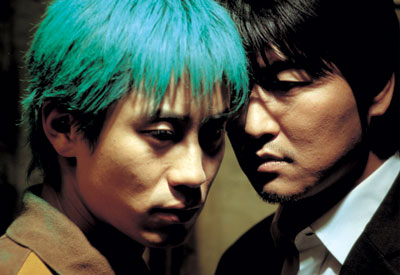DEATH WISH
By Travis Crawford
 |
Park Chan-Wook, the director of the hair-raisingly brutal new thriller Sympathy for Mr. Vengeance, is one of the key filmmakers in South Korean cinema’s much-heralded creative and commercial renaissance. His melancholic military-themed melodrama Joint Security Area (2000) quickly became one of that country’s biggest box-office successes, and following this landmark hit, Park could have undoubtedly embarked upon any project he desired. Rather than continue down a safely commercial pathway, however, Park exploited his newfound freedom for all it was worth, and delivered one of the most important films in contemporary Korean cinema.
Sympathy for Mr. Vengeance is a startlingly bloody, blackly comic and visually arresting neo-noir unlike anything else in recent Korean film. A dream project for Park, he had been trying without success to finance the film prior to Joint Security Area. "I wrote it six years ago – overnight, as if I was crazy – after I had done two movies, both failures, and I was an unknown director," Park reflects. "The characters in most Korean films are overly emotional and sympathetic, and I wanted to do the opposite, characters like American hard-boiled fiction figures – cold, flat, pessimistic."
Park intended to return noir to its grim Raymond Chandler roots, rediscovering a lost sense of menace and existentialist despair. Mission accomplished: You walk away from Sympathy as you would stagger away from a carnival ride that spun dangerously out of control, not knowing whether to feel giddy or just bruised. Park’s tale of a wealthy industrialist hunting the couple (a mute, blue-haired factory worker and his politically radical girlfriend) responsible for his child’s abduction is rough stuff, indeed. Sympathy is unflinchingly explicit in its presentation of grim material – from prepubescent autopsies to black-market organ traffickers, from electroshock torture to arterial blood geysers – but it never loses compassion for its characters. "Most Korean films depict life as something beautiful, but life is really very difficult; a lot of people suffer, and that’s not often seen in films, so I wanted to be honest about that," says Park. "Despite the darkness, I wanted to stress the ironic comedy inherent in the movie. It’s bitter laughter, though." Explaining his decision to tell his story primarily through imagery – a rarity in Korean (not to mention American) cinema – Park notes, "Most commercial movies explain everything, and everybody just talks. But I wanted to use very little dialogue, and convey my message through sound and mise-en-scène. I tried to achieve a surreal, unconventional effect by intercutting wide-angle shots with extreme close-ups."
Though it was often praised (one critic went so far as to – perhaps rightfully – label it the best Korean film ever made), Sympathy was, unsurprisingly, not a commercial success upon release, and there were many viewers who felt betrayed that Park’s film was not more akin to his previous blockbuster. But for Park – currently at work on a segment of a Korean omnibus film about discrimination – embracing dark subject matter is its own reward: "If this type of movie were typical for this time, I wouldn’t have done it – but this darkness is part of our lives, and no one [in Korea] is dealing with it."
Distribution inquiries regarding Sympathy for Mr. Vengeance can be directed to CJ Entertainment’s Karen Moon at karen@cj.net.
VOD CALENDAR


 See the VOD Calendar →
See the VOD Calendar →


